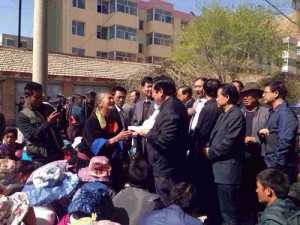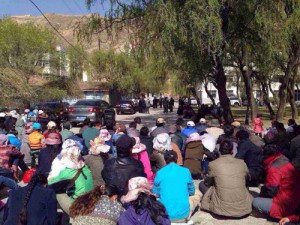
In the People’s Republic of China, a ‘substitute teacher’ is someone who is employed to teach in a primary or middle school but is not on the official payroll and in the vast majority of cases are “high school graduates who did not go to a university or college.[i]
In contrast, their public teacher counterparts or ‘formal teachers’[ii] are expected to have “at least a three year college education” to work as a primary school teacher, while middle school public teachers “should have four years of university education”.[iii] Furthermore, unlike their substitute teacher colleagues, public teachers are on the official payroll.
In regards to rural Tibetan regions, substitute teachers have played a fundamental role in increasing the availability of education. However, despite playing a crucial role in providing education to some of the most disadvantaged regions in Tibet, they have never been granted the same degree of benefits as their public teacher counterparts.
On 30April 2014, over 160 substitute teachers and staff from Rebkong (Ch: Tongren) County schools in Malho (Ch: Huangnan) Tibetan Autonomous Prefecture, Qinghai Province, took to the streets to demand the same legal status as public teachers, reported Tibet Times,[iv] a Tibetan language weekly published by Tibetan exiles in India. A video of the teachers petitioning the local government leaders is available here.[v] The predominantly Tibetan protest group gathered outside the prefectural government offices in an effort to force the authorities to address the decade old problem, however, the authorities showed little interest in intervening to resolve the issues.
This failure to resolve the issues prompted the protestors to schedule another protest on 7 May 2014 in an effort to raise the matter of the terms of their employment with the provincial government authorities. The approximately 160 marchers that arrived on the day were due to march from Rebkong to the provincial capital of Xining. However, on 8 May 2014 before they had completed their journey, both officials and school principals from Rebkong County met the protest group and informed them their demands would be implemented. After receiving these promises, the protestors abandoned their march to Xining. However, to date, no information has been made available on how provincial government authorities shall aim to make Qinghai’s education system more equitable for substitute teachers.

In both instances, the protests were caused by substitute teachers’ unhappiness regarding inequalities between substitute teachers and their public teacher counterparts, such as, inequalities in monthly wages and job security.
In relation to inequalities in wages, substitute teachers receive a mere 500 to 1,000 yuan per month compared to the 3,000 to 5,000 yuan per month that full-time public teachers earn,[vi] this is despite the fact that both groups in theory have the same workload and perform the same tasks. In addition to this, substitute teachers do not receive social welfare benefits such as, medical care, which constitute a considerable percentage of a teacher’s income.
Furthermore, the vast majority of substitute teachers work in poorly funded rural schools that “cannot afford investments in new buildings, desks, equipment, or daily supplies”.[vii] Hence, this lack of the basic material required to teach, increases these rural substitute teachers’ workload above that of their urban counterparts. Moreover, substitute teachers lack any job security and can be let go at any stage with little or no compensation.
These inequalities are not, however, a new phenomenon, with many of these inequalities stemming from the minban teacher era. The minban teachers were essentially the same as substitute teachers. “They were hired by the school or village and were paid by the village or township or county in some cases”; similarly, they were paid a lesser wage than their public teacher counterparts. Also, “they did not have job security and did not enjoy any welfare benefits”.[viii]
However, due to the PRC’s Ministry of Education essentially banning the use of minban teachers in Chinese schools in 2000, the profession was rebranded as substitute teacher and by 2001 it was estimated that there were 705,000 substitute teachers working in the PRC.
In 2006, the Ministry of Education began similar efforts to remove substitute teachers from China’s education system, with the Ministry claiming that between 2006 and 2010 “all the 448,000 remaining substitute teachers in China would be laid off”.[ix]
However, substitute teachers still continue to play a major role within the education system in Tibetan areas, with Chinese statistics estimating in 2010 that there were still 310,000[x] substitute teachers working predominantly in the rural western regions of the PRC.
The continued use of substitute teachers is largely due to the fact that the amendments to the Labour Contract Law of the People’s Republic of China, which came into force on 1 March 2014, did not incorporate public schools[xi] in its effort to discontinue PRC’s reliance on low paid temporary workers. Thus, this failure to incorporate public schools in a policy that aimed to force employers to offer full time employment to ‘temporary’ employees, has allowed for education administration to continue abusing this system. Hence, allowing the PRC to maintain its low rural education costs.
There has been a great deal acknowledgement within the PRC of the key role substitute teachers play in the PRC’s rural education and the injustice of the PRC’s policies towards them. Even the PRC’s state owned media have been critical of the government’s current stance on temporary teachers. For instance, in 2012 Xinhua published a highly critical article entitled ‘Rural teachers deserve more respect, better pay’,[xii] which expressed disapproval of how government authorities treated substitute teachers and called for an end to the discrimination against them.
Despite the large degree of criticism of PRC’s policies towards substitute teachers, it is unlikely for the Chinese government to change its position on substitute teachers. This is largely due to the Chinese government’s desire to both distance Chinese education system from, what they see as, the passé community support teachers and to introduce a more ‘modern’ centralised Chinese education system with teachers who all hold college and university degrees.
Furthermore, in rural Tibetan regions, the shortage of qualified teachers coupled with the reluctance of many teachers to accept positions in, what is seen as, underdeveloped regions means that the Chinese government’s current ambition to reduce the number of substitute teachers and maintain recent accomplishments in increased rural enrolment rates in primary and secondary education are unfeasible.
In addition, it is also unrealistic for the PRC’s Ministry of Education to expect these “poor teachers (to) have to spend several years to acquire that ‘eligible education’,” and then still not offer them the same entitlements as public teacher until “they have to pass the employment test”. Hence, it is instead recommended that the PRC grant substitute teachers currently working in the education system the same legal status as public teachers, while introducing alternative measures to increase their skill base but, while also allowing them to continue to work. For instance, the PRC could provide both on and off the job training programmes in order to ensure substitute teachers meet the standards required by the Ministry of Education to teach in PRC.
In conclusion, the PRC’s discrimination of substitute teachers and their efforts to ‘modernise’ the education system place great risk upon the PRC’s ability to provide an education in areas such as, Rebkong County. It is instead recommended that the PRC focus on maintaining the number of substitute teachers in rural Tibetan regions and focus upon providing them with the skills required to teach in the PRC’s modernising education system while continuing to allow them to teach.
[i] Liu Shinan, ‘Substitute Teachers Should Be Respected’ (China Daily, 8November 2006) < http://www.chinadaily.com.cn/opinion/2006-11/08/content_727352.htm> accessed 20May 2014
[ii] Wang Yishu, ‘Conversation with Wang Yishu and Former teacher and Advisor to China’s Ministry of Education’ (Magnum Foundation, 15 September 2011) <http://emergencyfund.magnumfoundation.org/projects/substitute-teacher/> accessed 25 May 2014
[iii] Abhimanyu Singh, ‘Taking a stand for rural teachers in China’ (China Daily, 4October 2012) <http://www.chinadaily.com.cn/opinion/2012-10/04/content_15796923.htm> accessed 20May 2014
[iv] Pema Tso, ‘Tibetan Substitute Teachers Petition [the government]’, (Tibet Times, 8 May 2014) http://tibettimes.net/news.php?cat=3&&id=8857> accessed 8 May 2014
[v] ‘Teachers’ Struggle’, 8 May 2014, http://www.youtube.com/watch?v=rLcJRELJjOY#t=16 (Source: Tibet Times)
[vi] Rigdhen Dolma, Chakmo Tso and Lumbum Tashi. Translated by Rigdhen Dolma. Written in English by Richard Finney, ‘Tibetan ‘Substitute’ Teachers Call for Benefits, Higher Pay’ (Radio Free Asia, 2 May 2014) <http://www.rfa.org/english/news/tibet/teachers-05022014162845.html>accessed 20May 2014
[vii] Emily Hannum,, and Albert F. Park, ‘Educating China’s Rural Children in the 21st Century (2002) 3(2): 8-14 Harvard China Review <http://economics.ouls.ox.ac.uk/15132/2/hcr.pdf > accessed 21May 2014
[viii] Xiang Biao, ‘How far are the left-behind left behind? A preliminary study in rural China’ (2005) Oxford Centre for Migration, Policy and Society Research Paper No. 12/2005 http://www.compas.ox.ac.uk/fileadmin/files/Publications/working_papers/WP_2005/Xiang%20Biao%20WP0512.pdf > accessed 21 May 2014
[ix] CC Huang and Key, ‘China, where is your conscience? The tragic curtain call of substitute teachers’ (ChinaHush, 7th of January 2010) < http://www.chinahush.com/2010/01/07/china-where-is-your-conscience-the-tragic-curtain-call-of-substitute-teachers/> accessed 20May 2014
[x] ‘China Voice: Rural teachers deserve more respect, better pay’, (Xinhua, 10September 2012) < http://news.xinhuanet.com/english/china/2012-09/10/c_131840963.htm> accessed 20May 2014
[xi] ‘China Employment Law ALERT: New Regulations on Temporary Employees (Labor Dispatch), (Seyfarth Shaw LLP, 12th of February 2014) <http://www.seyfarth.com/uploads/siteFiles/publications/ChinaLawNewRegulationsonTemporaryEmployees.pdf> , accessed 21 May 2014
[xii] ‘China Voice: Rural teachers deserve more respect, better pay’, (Xinhua, 10 September 2012) < http://news.xinhuanet.com/english/china/2012-09/10/c_131840963.htm> accessed 20May 2014; see also ‘Rural teachers deserve more respect, better pay’, (China daily, 10September 2012) < http://www.chinadaily.com.cn/china/2012-09/10/content_15748269.htm> accessed 20May 2014
